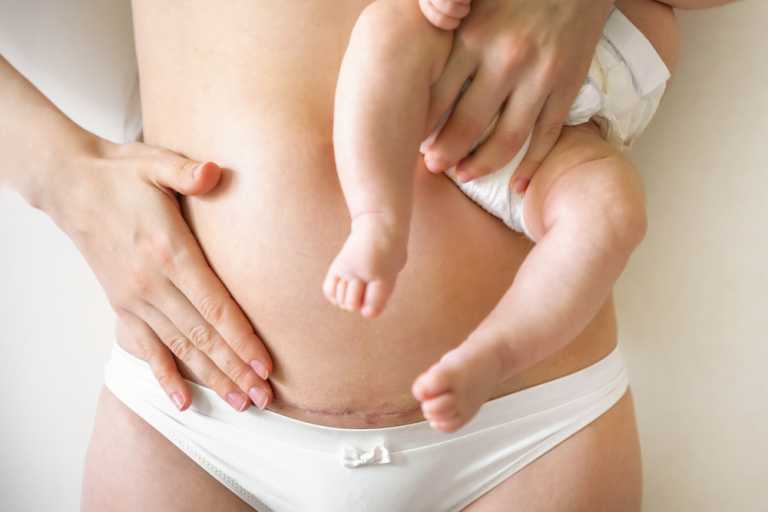A missed or irregular period is natural after pregnancy. It might be time to worry if you don’t get your period within two to three months after delivery. Breastfeeding moms may not see their period for several months or years. We’ve gathered experts and resources to help you know everything to expect and what is unexpected with your cycle after giving birth.
When Do You Get Your First Period After Pregnancy?
You can expect your period around 6 to 12 weeks after delivery if formula-feeding your baby. Breastfeeding moms may wait a bit longer. Everyone is different.
Your periods may also change after giving birth. For example, the length of your cycle or the size of your flow can increase or decrease.
Lochia is the bloody vaginal discharge you experience after giving birth. This natural process is not your cycle. Instead, it’s the body’s way of cleaning out your uterus after childbirth.
Its dark red discharge occurs the first three days following delivery. Then, it turns to a more watery and pink-brown discharge.
According to the Cleveland Clinic, the discharge should finally turn creamy-yellowish after about two weeks. The lochia process typically stops within four to six weeks. Vaginal bleeding after this time will likely be your period if bottle-feeding your baby.
When Will I Get My Period If I’m Breastfeeding?
A woman can expect her period once she weans her baby or babies from breastfeeding. It may also happen after breastfeeding for a few months.
When nursing, your body releases a hormone called prolactin. It allows you to produce breast milk and develops mammary glands in your breasts. That is where milk production takes place.
Each time your baby sucks on your nipple, your prolactin levels increase. Then, prolactin causes breast milk production. The spike in prolactin also affects other hormones in your body.
For example, FSH and LH regulate your menstrual cycle. So, when prolactin causes its levels to decrease, you don’t have a period. That’s why moms don’t experience their cycles while breastfeeding. Formula-feeding moms shouldn’t experience this hormone fluctuation.
Can Pregnancy Cause a Missed Period?
It’s possible to become pregnant shortly after giving birth. Ovulation can occur within a few weeks of giving birth. A breastfeeding mother may not see ovulation occur for months after.
You may become fertile about two weeks before your period starts. This means your ovary releases an egg before you shed your uterine lining making conception possible. A simple pregnancy test is often the first step in ruling out a cause of a missed period.
Possible Causes of No Period After Pregnancy
The absence of your period is known as amenorrhea. There are several reasons why you miss your period after pregnancy. We’ve listed some signs and concerns to look for during your recovery.
Hormonal Imbalances After Pregnancy
Your brain regulates many body processes. One of these is slowing and stopping the release of the gonadotropin-releasing hormone (GnRH). This hormone starts your menstrual cycle. The imbalance occurs with a condition known as hypogonadotropic hypogonadism.
When it occurs, you may also have the following:
- Low body weight
- Low body fat percentage
- Excessively low-calorie diet
- Emotional stress
- Strenuous exercise regimen
- Other medical conditions
A missed period is a sign of an eating disorder. You may feel pressure to lose the weight gained with pregnancy. As a result, your calorie intake may be too low, or you’re working out too much.
Remember to give yourself a break. The body is transformed during pregnancy and giving birth. Adjusting and getting your body back to a pre-baby shape will take time. So, it’s best to focus on being healthy and keeping your baby healthy postpartum.
Community support groups and online forums are great ways to chat with other moms going through the same experience. Your healthcare provider may also recommend hormone therapy pills or injections to help. A well-balanced diet of healthy foods also treats the condition. Once regulated, the period returns.
Vitamin D Deficiency
Studies suggest a link between vitamin D deficiency and menstrual cycle problems. A recent research article showed that about 40% of women with low vitamin D levels also had a menstrual disorder.
Many factors are considered when looking at vitamin deficiency causes, such as lack of nutrition or another health condition. Your healthcare provider can check your vitamin level to ensure it’s normal.
Keep in mind a low vitamin D inhibits the body from absorbing calcium, too. Taking vitamin D and calcium supplements are great ways to stay healthy and prevent deficiency.
Endometrial Damage
Asherman syndrome occurs when scar tissue forms in your uterus or cervix. The causes of the condition are:
- Retained placenta after giving birth.
- Elective abortion
- Missed or incomplete miscarriage
- Uterine fibroid surgery
Doctors often miss Asherman syndrome since many don’t experience any symptoms. But others missed their period after childbirth.
They can still have menstrual pain when they expect their period to begin. The pain comes from the build-up of endometrial tissue during your cycle. But the lesions block any blood flow so you never have vaginal bleeding.
You may need surgery to treat your condition at some point since you’re at risk for miscarriage, preterm labor, and infertility.
Birth Control
The birth control pill and other contraceptives can cause a missed period. A method you may use includes:
- Birth control pills
- Injectable contraceptives
- Hormonal intrauterine devices (IUDs)
- Skin hormone patches
- Vaginal rings
Each type uses a form of progesterone to prevent ovulation and menstruation. Some use it in combination with other hormones to prevent pregnancy.
There are lots of options and resources available regarding birth control. Contraception can cause a period each month, every three months, or once a year. It depends on the level of hormones and the type of contraceptive used.
You and your doctor can decide which is best for you. You may also consider including the father or partner, if applicable, in the decision so you’re on the same page.
Medications and Therapies
Antidepressants and blood pressure medications may cause a missed menstrual cycle. They might trigger hormone changes that prevent ovulation in the body.
Chemotherapy and radiation treatments also impact your menstrual cycle. Women with blood, breast, and gynecologic cancer may experience adverse effects from treatment since it can destroy cells that produce estrogen and damage the ovaries. Your period stops as a result.
Stress
Research suggests a direct link between stress and your menstrual cycle. One study showed that 39% of women experiencing missed periods also felt high stress. Other menstrual problems like worsening premenstrual symptoms (PMS) and abnormal bleeding also occur.
It’s normal to feel overwhelmed as a new mom. Mental health conditions like postpartum depression can appear up to a year after you have your baby or later. Mothers having a hard time should contact loved ones and their doctor or midwife for help.
Parents often need each other’s support to get through the challenges of bringing their baby home. If you’re a single parent, consider contacting a friend or support group for advice and encouragement.
Thyroid Disease
Women are more likely to experience thyroid disease than men. One in eight women will develop thyroid problems in their lives. The condition can cause:
- Menstrual period problems
- Infertility
- Pregnancy complications
The thyroid gland controls the menstrual cycle. If you have too much or not enough thyroid hormone in your blood, it can affect your period. It can even stop for several months.
An exam and blood work from your doctor can check your thyroid hormone levels. The treatment recommended depends on whether the level is too high or too low. Medication, diet, and surgery may be an option to manage your thyroid disease.
Polycystic ovarian syndrome (PCOS)
Polycystic ovarian syndrome (PCOS) affects one in ten women. A hormonal imbalance occurs from PCOS, leading to missed or irregular periods. Infertility also results from the condition.
Females living with PCOS may only experience eight periods a year. Some women stop having them altogether. Other symptoms of PCOS include:
- Abnormal facial hair growth
- Acne on the face, chest, and back
- Hair loss or thinning
- Weight gain
- Difficulty losing weight.
- Darkening of skin along the neck, groin, and underneath breasts
- Skin tags
There is no cure for PCOS. You and your doctor can work on a treatment plan to address your symptoms. They can also provide information on options for having more children if desired.
Early Menopause
Early or premature menopause may also put a stop to your menstrual cycle. Early menopause is diagnosed if you go through menopause before you turn 40 years old. About 5% of women experience the condition.
It happens when your ovaries stop producing hormones. Causes of premature menopause include:
- Health conditions like rheumatoid arthritis and chronic fatigue syndrome
- Smoking
- Chemotherapy and radiation
- Family history of early menopause
- Surgery to remove the ovaries.
- Hysterectomy
You may also experience more symptoms than a missed period. For example, hot flashes and sleep problems occur with early menopause.
When Do I Talk to My Doctor or Birthing Specialist?
Having a baby is more complicated than choosing baby names and buying baby products. Your body goes through quite a transformation during conception, pregnancy, childbirth, and after. It can take some time to get back to normal.
If you’re worried about your period not returning, call your OB or birthing specialist with all your questions or anything else weighing your mind. They will likely have an answer or solution to help.
It’s also best to contact them if you have the following concerns:
- Severe cramping or abdominal pain
- The passing of huge blood clots
- Foul-smelling vaginal discharge
- A fever greater than 100.4 degrees Fahrenheit
- Severe chills
- Pain, burning, or trouble peeing.
- Increased redness, swelling, bruising, or pain in your vaginal area.
- An increase in the amount of vaginal discharge or bleeding leads you to use more pads than before.
- Blurry vision
- Severe headaches
- Fainting
- Severe pain, swelling, or redness in an arm or leg.
- Warm and red painful areas on your breasts
- Trouble breathing
- Feeling an inability to cope with everyday life.
- Thoughts of harming yourself or your baby
- High levels of anxiety
- Extreme sadness
- Painful sex or tampon insertion once cleared for both by your doctor




